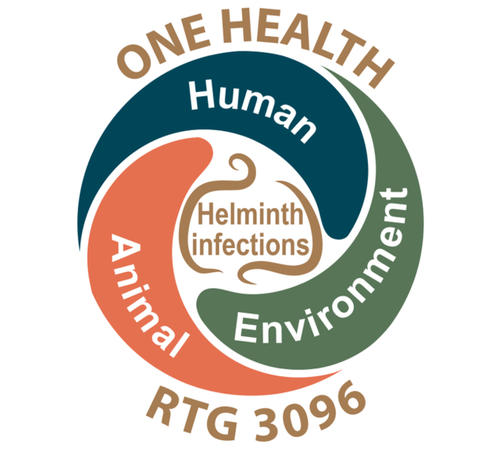Research Training Group (GRK) 3096 'One Health Approach to Soil-Transmitted Helminths'
Ausschreibung im Rahmen eines strukturierten Promotionsprogramms
About the RTG (Research Training Group) 3096 | One Health Approach for Soil-Transmitted Helminths
Soil-transmitted helminths (STH) are parasitic worms which affect humans, animals and the environment alike. They are among the most common infections worldwide: 24% of the world‘s population suffers from STH and the infections are also highly prevalent in farm animals, where it is a re-emerging disease. Further, the environment is affected by accumulated soil contamination with helminth eggs and massive socioeconomic implications for affected populations.
The extremely harmful consequences of STH infections are in stark contrast to the low scientific and social awareness of these infections and the lack of training for future researchers in this field. GRK 3096 aims to close this training gap by educating the next generation of helminthologists in a One Health approach that addresses soil-transmitted helminths in humans, animals, and the environment.
Within the three One Health areas “humans, animals and the environment” our RTG has defined research gaps on which the research projects will focus on. These are:
- Clinical consequences of STH infections for infected humans & animals.
- Identification of infection mechanisms of STH in humans and animals to identify new intervention targets.
- Targeting environmental issues of STH in humans and animals to enable better public health interventions
Call for Application
As members of the German Research Foundation (DFG)-funded Research Training Group (GRK) 3096 'One Health Approach to Soil-Transmitted Helminths', successful applicants will work on scientific projects in an interdisciplinary manner within a structured doctoral program.
The projects address the three 'One Health' aspects:
- human roundworm infections (close cooperation and fieldwork in Kenya/Africa),
- roundworm infections in farm animals (chickens and pigs in Germany) and wildlife, and
- environmental factors (sociological and economic field studies in Kenya and Germany).
The GRK will thus incorporate human, animal, and environmental aspects into the research and training of candidates in order to train “One Health” infectious disease specialists. After four years of training in the structured doctoral program and the acquisition of at least 30 CP, candidates have the opportunity to obtain a certificate for the successful completion of a graduate school.
Application Deadline
Application deadline for PhD positions: Oct 30, 2025
Contact
Professor Dr. Susanne Hartmann, RTG 3096 Spokesperson
Phone +49 30 838 518 24
E-Mail susanne.hartmann@fu-berlin.de
Schon abonniert? Newsletter der Freien Universität Berlin für Osteuropa und Zentralasien
Wollen Sie regelmäßig Informationen zu aktuellen Ausschreibungen und Veranstaltungen in Berlin, Osteuropa und Zentralasien erhalten?
Dann schreiben Sie uns einfach eine E-Mail unter Angabe von Vorname und Nachname mit dem Betreff "Subscribe" an easterneurope@fu-berlin.de oder folgen Sie uns auf Facebook, Instagram, VKontakte oder Telegram.

